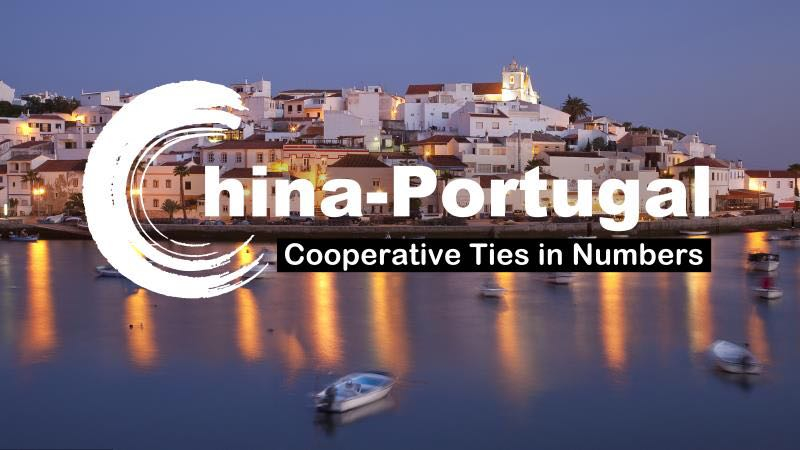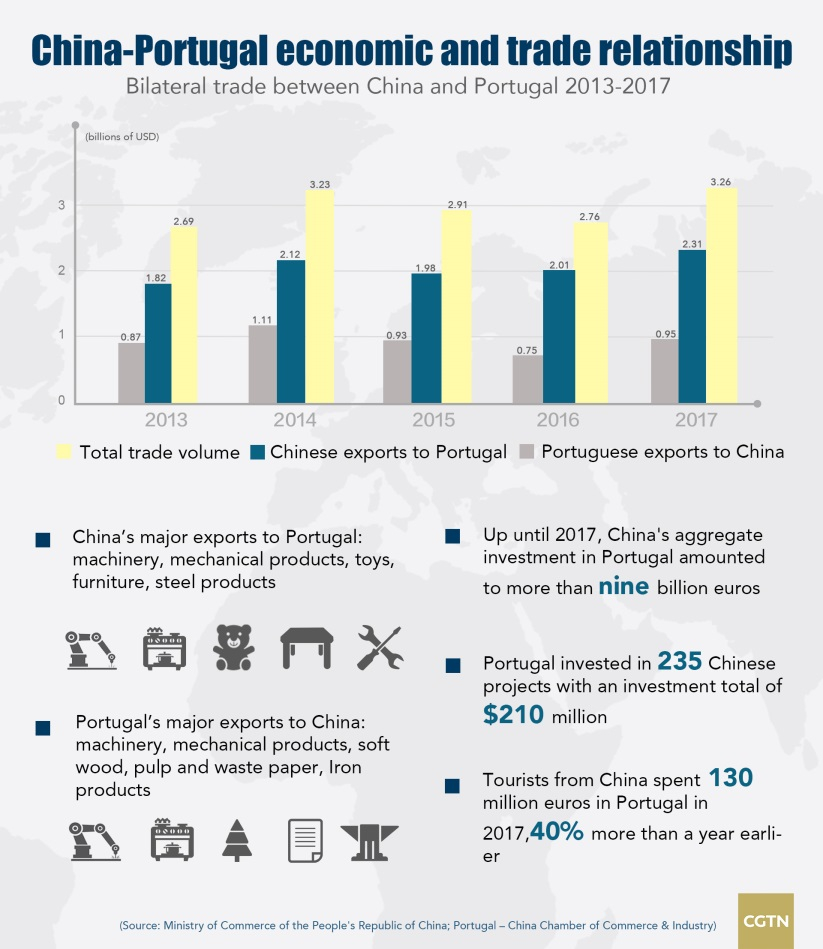
Business
16:35, 03-Dec-2018
China and Portugal's strategic relationship
Updated
16:33, 06-Dec-2018
CGTN

Chinese President Xi Jinping will be in Portugal on December 4-5. This is the first official visit by a Chinese head of state to Lisbon since 2010 and it happens about three months before the 40th anniversary of the establishment of diplomatic relations between the two countries.
Since the introduction of China's Belt and Road Initiative (BRI) in 2003, Portugal has shown consistent understanding and support of the proposal. With Chinese President Xi Jinping's state visit to the country on December 4-5, it is likely that Portugal will be included as a new member of the BRI; even if not, the existing strategic partnership between the two countries is certain to be elevated to new stages.
Since China and Portugal signed a strategic partnership in 2004, Portugal has been an important recipient of Chinese investment, both private and public. Between 2010 and 2016, the level of Chinese foreign direct investment (FDI) went from zero to 5.7 billion euros. Up until 2017, China's aggregate investment in Portugal amounted to more than nine billion euros.

As the only country willing to step in at the height of Portugal's financial crisis Portugal in 2010, China has invested in a wide range of sectors in the country – from energy (Galp, REN, Energias de Portugal-EDP) to transportation (national air carrier TAP), along with a significant presence in insurance (Fidelidade), health (Grupo Luz Saude), financial services, real estate and media.
Portugal welcomed investment from China and perceived such partnership as a success for the country's economy. Portuguese Economy Minister Pedro Siza Vieira said this November that “it is true that Chinese investment has been significant in recent years and we welcome this.” In 2017, the government relaxed an investment rule that previously barred Chinese companies from combining their votes in case of a takeover bid – which makes it easier for Chinese state-owned company, China Three Gorges, and its Chinese partner CNIC to vote as shareholders whenever a takeover bid arises.
Such bilateral economic ties is likely to be elevated to new stages following Chinese President Xi Jinping's visit. And signals have already been sent out leading up to Xi's visit.
On May 18, China's State Councilor and Foreign Minister Wang Yi called for elevating their comprehensive strategic partnership to new stages during a joint press conference with his Portuguese counterpart Augusto Santos Silva. One important new prospect is, as mentioned in Wang's talk, the joint building of the BRI. Thanks to Portugal's advantageous geographical location, the country has the potential to become an important hub for the building of the 21st Century Maritime Silk Road.

Last October, the Portuguese foreign minister Augusto Santos Silva referred to the completion of a memorandum of understanding under the BRI, focusing on infrastructure investment and underlining Portugal's key interest. It is highly likely that many more projects will be announced during the upcoming state visit.
As a matter of fact, China and Portugal have already engaged in cooperation initiatives in a form beyond FDI and in the area beyond energy, infrastructure and finance.
During the Blue Economy Partnership Forum held in southeast China's Fujian Province in 2017, a blue partnership was established between China and Portugal, making Portugal the first country to officially launch a blue partnership with China. Aspiring to build a sustainable marine ecological civilization, China can benefit a lot from referring to Portugal when it comes to marine governance. The blue partnership has also been included into the scope of the joint building of the BRI.
Just recently, a new technological laboratory, STARLab, jointly funded by Portugal and China, was announced to be launched before March 2019 to focus on the construction of microsatellites and the observation of the ocean. The research center will be built in Matosinhos, Peniche in Portugal and Shanghai, China.
If FDI has contributed to the cooperation ties between China and Portugal since the two countries signed a strategic partnership in 2004, Chinese President Xi Jinping's state visit will expand the scope of such cooperation with more initiatives likely to be introduced and implemented under the BRI and beyond.

SITEMAP
Copyright © 2018 CGTN. Beijing ICP prepared NO.16065310-3
Copyright © 2018 CGTN. Beijing ICP prepared NO.16065310-3